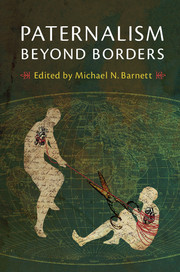Conclusion: The World According to Paternalism
Published online by Cambridge University Press: 01 December 2016
Summary
Paternalism can be broadly understood as the substitution of one actor's judgment for another's in order to improve the object's welfare, interests, and happiness. Whether such actions evoke feelings of admiration or condemnation often depends on the eye of the beholder and whether one is the giver or the receiver. The subjects of the chapters – including human rights activists, asylum case officers, gender specialists, protection officers, UN officials, relief workers, peacebuilders, and legal experts – all present themselves as motivated by a sense of compassion and duty. Enacting an ethic of care and responsibility, they were attempting to correct perceived injustices, defend vulnerable populations from harm, and provide new opportunities and choices to marginalized and oppressed peoples. As Swaine observes of aid workers, but probably is true of many others mentioned in this volume, they were acting on an “imperative,” the heartfelt belief that something had to be done. However, as she and others acknowledge, this imperative can lead them to act first and ask questions later, if ever. Sometimes they apologize for their neglect. At other times, though, they offer reasons why their unilateral actions were unavoidable, understandable, and perhaps even in the best interests of the population in need.
Yet few actors, regardless of the imperatives or circumstances, want to be seen as a paternalist or accused of acting paternalistically. Care is one thing, but control and domination are quite another. Wanting to improve the circumstances of the marginalized is a noble calling, but substituting their judgment for another's is generally perceived to be beyond the bounds of acceptability. There is a thin, and often invisible, line between care and control. But not all offenses are equal. Arguably the paternalism of the nineteenth-century imperial powers described by John Hobson is more offensive than the paternalism that occurs in Palestinian refugee camps as described by Ilana Feldman. Stephen Hopgood's chapter on female genital mutilation/cutting describes how Western actors have adopted different kinds of tactics in their century-long effort to stamp it out; some forms, he intimates, are more disrespectful than others.
- Type
- Chapter
- Information
- Paternalism beyond Borders , pp. 316 - 344Publisher: Cambridge University PressPrint publication year: 2016

